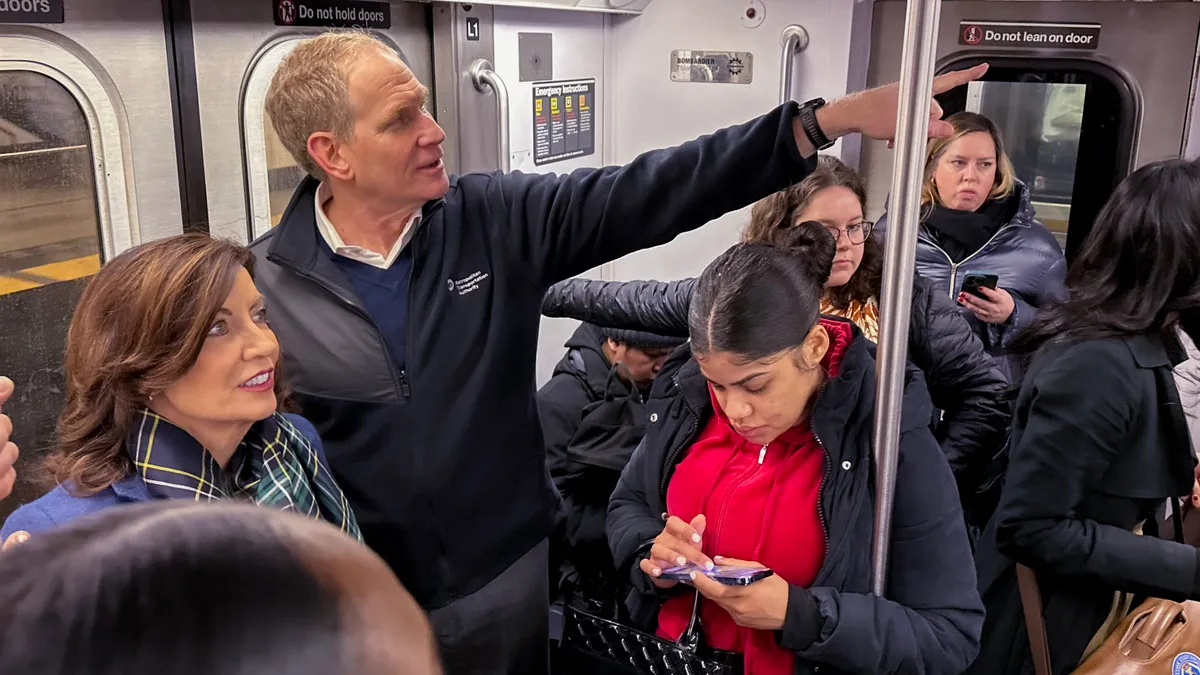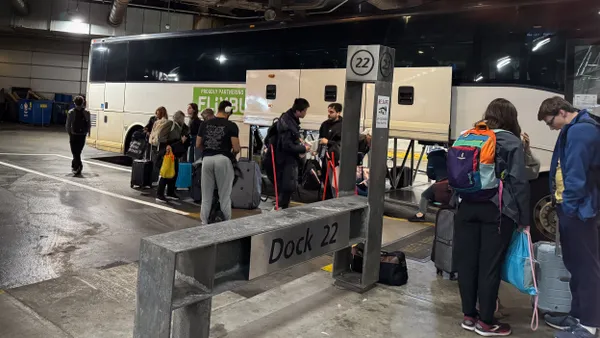Dive Brief:
- New York Gov. Kathy Hochul and the state legislature agreed late Tuesday on a fiscal year 2024 budget to save the Metropolitan Transportation Authority from the worst aspects of a looming budget gap that could have led to a large fare hike and reduced service for New York City transit riders.
- The budget increases the top rate of the state’s payroll mobility tax for the largest businesses in New York City, which is expected to raise $1.1 billion annually for the MTA and includes one-time injections of state aid.
- “With this Budget, the MTA will have the resources it needs to keep serving New Yorkers for years to come,” Hochul said in a statement.
Dive Insight:
Even as riders have begun to return to the subways in New York City, the region’s transit agency faced a budget shortfall of $2.5 billion a year starting in 2025. The MTA’s 2023 budget proposal, released in November, warned that “staffing reductions, higher fare increases, deferral or cancellation of capital projects, and/or service reductions” would be needed absent additional government funding.
The final budget agreement provides $300 million in one-time state aid to the MTA; $35 million to improve subway service during off-peak hours, weekends and weeknights; and $35 million in unspecified safety investments. A further $65 million will go to lowering the proposed 5.5% MTA fare increase to 4%.
The MTA announced Thursday evening that it plans to increase weekend service on three subway lines beginning in July and roll out more midday, evening and weekend service on additional lines starting in August.
“Together, riders built a broad and deep coalition drawing support from labor and business groups, climate justice and disability rights organizations to win over a billion dollars in new public transit funding that the MTA can count on for years to come to deliver meaningfully better service than before the pandemic,” said Riders Alliance Executive Director Betsy Plum in an emailed statement.
The MTA must find $400 million in operating efficiencies to reduce expenses and improve service to customers, and New York City will increase its share of funding for paratransit services through 2025, generating nearly $165 million annually.
Additionally, if three downstate casino licenses are approved, the MTA will share in annual tax revenues from the casinos and receive $1.5 billion in licensing fees.
But the payroll tax is controversial. “Despite Governor Hochul’s vow not to raise income taxes, she and state legislators apparently had no trouble signing into law a major increase in the payroll mobility tax for large New York City businesses,” said John Ketcham, a fellow and director of state and local policy at the Manhattan Institute, in an emailed statement. He added that the tax increase “effectively takes the city’s big businesses for granted, assuming that they will never relocate.”
As part of the budget deal, $15 million will go toward a pilot program to enable one bus route in each of the city’s five boroughs to trial a zero-fare program. The New York Lawyers for the Public Interest said in an emailed statement, “We strongly support the free bus service pilot program included in the budget, and urge the Governor, Legislature, and MTA to consider ways to rapidly expand free and heavily discounted transit fares.”
But New York’s transit agency isn’t alone in facing a fiscal cliff driven by the spend-down of federal pandemic relief funds and a still-slow return of ridership. Industry analysts say that agencies that rely heavily on fare box revenue need to find new revenue streams and riders.












